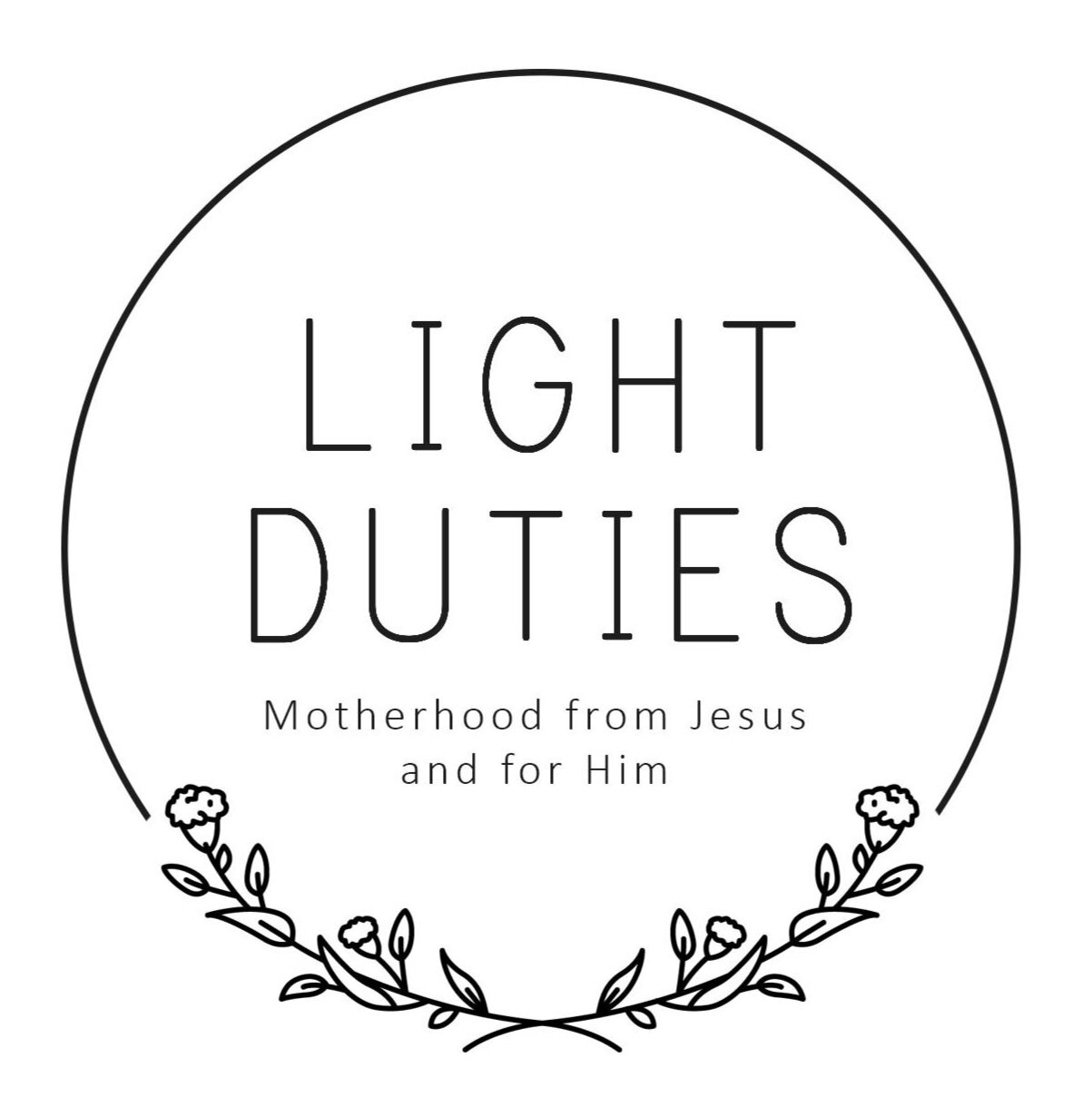
#24. The Non-Negotiable, Essential Duty of Motherhood
Our overarching purpose in motherhood is to help our husbands raise our kids in the ways of gospel godliness, to teach our children to live under the Lordship of Jesus. In our zeal to do this, we can get carried away making things very complicated. We collect special props and programs. We have Pinterest boards for Bible craft. We move churches because we like the sound of the kids’ program somewhere else. We fret over the spiritual state in our marriage and home. Perhaps we’re keen to rearrange and re-order everything as the Bible animates us in new godliness (and praise God if that is the case!), but one mistake is to think we need to get everything right for God to be able to work in us and our kids. In our eagerness, we can forget the foundation of it all.

#23. The Good Word Lights Up the Good We Are to Give
The Bible tells us about the good we owe, but it’s not the sort of answer which you find looking up, “motherhood” in a concordance. The more Bible we ingest (read in the spirit of delighted submission, rather than mere academic inquiry), the better we get at dealing well with things outside the Bible. A constant soaking in Scripture helps us respond biblically to things which the Bible doesn’t specify. You won’t find God’s rule for screen time in the Bible, but you will find a whole lot of wisdom and principles which help us trace out what’s good—good which we have a duty to pursue. A wholehearted reading of Scripture helps us interpret the present.

Unseen Motherhood {bonus}
Most of the good things a mother does will not be seen. When an orchid blooms in the wilderness, behind a rock where no human walks, is it less beautiful? God has made the universe in a way where people only notice a very small part of the glory. There are magnificent ecosystems which most of us know nothing about. God litters the earth with beauty, much of which no one but himself ever sees. A human audience doesn’t make a thing more real, more beautiful or more important. There is an extravagant beauty in the hiddenness and a heavenly Father who enjoys it very much.

#22. Withhold Not Good
The early years of our children’s lives are a temporary opportunity to do a crucial duty. It’s not uncommon to think about duty as the sour occasion of doing the bare minimum, a minimum exacted (or perhaps extracted) from us like a rotten tooth. A cold, begrudged, painful transaction. It whiffs of box-checking and accounting and withholding anything beyond necessity. Like paying taxes. But that is distorted, devouring duty. By the Bible’s measure, God-centred duty is a lively and enlivening pursuit. It’s eagerness to give what’s good, not seeing how little we can get away with.

#21. Choosing Timely Motherhood
We wake up every morning (and probably several times a night) feeling our package of limitations—the good, the fallen and the redeemed. For all our powerlessness, there is something Jesus has given us a small dominion over, there is still one thing we can change. Not the motion of time, not the fact that it moves whether we’re ready or not, but how we use it.

Because I’ve Just Numbered 40 {bonus}
With a recent birthday, I’m not old, but youth has long receded. Inside and out, I find I am a different texture, a different consistency, than I used to be. Though most of my children were born in my twenties, my thirties was the decade when the full number had arrived and they were all dependent. The years of tight togetherness. There will be no other decade of my life like it. As one of the kids said, (echoing Ecclesiastes), “there’s a time for everything”. Time past has gone quickly and it won’t come back. Stuck in a spent moment, life could be perpetual grief. With the new number on my days and my recent writing about limited and temporary motherhood, I have had Psalm 90 on repeat.

#20. Mothering is Temporary, But Not Disposable
One of the temptations to skimp in motherhood comes from how quickly it goes. Motherhood thrusts us into a long sequence of rapid stages. It’s ten thousand temporary things. Most of our work gets done, undone and redone with tools that will pass and perish. Temporary things are despised. Impermanence bleaches meaning. We confuse passing with meaningless, worth with longevity. Perishable and disposable, though both short-lived, are very different.
The work of mothering through the dependent years is very brief (as infinite as it feels while we’re doing it). We endure, passing the time just to get it done. Christians have a special flavour of this, where we discount motherhood because it seems so unspiritual. We conclude that because food, washing machines, paints and paper, mispronounced words and odd socks aren’t eternal, they don’t matter.

#19. Your Limited Life is No Accident
Limitations are a part of God’s good design for us. Some of these limits existed before sin and others are the rumbles of disorder that followed. Both tend to make us afraid and both are used by God to take us to the floor. That view of limitations is only comforting because Jesus knows those limits inside out. The hard edges of being human—sin, fear and death—have been mastered by Jesus.

#18. Good Motherhood is Limited and Afraid
Being a good mum would be easier if we weren’t human. We can’t quite master ourselves, our homes, the wills of the people who are dependent on us. We are at the mercy of forces beyond. We can’t guarantee outcomes. Our plans are thwarted. Life often demands what we don’t have at hand to give. Our imagination for good motherhood outruns our capacity to do it.
Even before sin, our first parents did not have the kind of mastery we aspire to.

#17. How Dads and Mums Might (Accidentally) Reform Churches
God’s way of teaching children his words and ways has always been through their fathers and mothers. Specialist Christian educators for children/youth/women are a very recent invention, a concession to the economic, social and familial fractures of our time. They are the bandaid, the medicine. Bandaids and medicines are not the goal, but tools to help us back to health. It’s hard to remember what health is, though.

#16. A Variety of Difficulties
As I mentioned in article #15, there’s such thing as a mum who is actively pursuing the kind of self-sufficiency that undermines her own obedience to Jesus. Perhaps similar on the surface, but profoundly different, is the woman who inherits a situation which she didn’t want. Two lives can scan the same in a snapshot, but beyond that moment they are moving in different directions, with different longings, different causes and different effects.
It might help to consider the variety of difficulties so we can discern our own starting place and trajectory.

A Biographical Interlude {bonus}
For better or worse, personal experience carries some persuasive weight. This is a little of mine.

#15. Hedging Our Bets
A lot of the trouble we have coming to terms with our duties as mothers is, at heart, a problem with what God says about marriage. That’s why we’ve spent a few weeks looking at the structural beams God has given us in marriage, the load-bearing skeleton of the whole. Without these in place, we end up with something smaller and more flimsy; a shack that might be better than nothing (as long as it doesn’t come down on anyone’s head), but where the buffetting elements are never far away. A place where fewer people can shelter and grow.

#14. About Fathers
I am not writing for fathers. That doesn’t mean they don’t need writing to. It’s just not my job. Consider this an article about fathers, rather than addressed to fathers.
One risk in writing a lot for mums is that I imply spiritual leadership in a household is ultimately the mother’s work. If there is no husband around, then it is. But when he is there, he is responsible for it. But how much of our thinking about motherhood features fathers? Do we see the raising and discipleship of our children as mostly mum’s job?

#13. More on Marriage: Motherhood as Helping
We talked recently about the instruction for women to love their husbands, love their children and be busy at home. These are the particular “goods” a woman who is married with children is to mature in. Eagerly. Devotedly*. We’re looking at some of the Bible’s backdrop to understand how this might be more profound than it seems.

#12. Responsibility: Men, Women and Marriage
Why do men and women get different instructions in texts like Titus 2? Let’s think about the architecture which leads to these differences.

#11. It’s Good to be Busy at Home
We often use the idiosyncrasies of our own family and home to dismiss whatever the Bible is telling us to do. As I said in article #10.
Good motherhood loves and pursues what God says is good
in the situation the mother and her children are in.
There are two parts to this. Firstly, understanding the good (even if it seems a world away from what is possible in our own home). Secondly, interpreting and maturing towards that good, in our particular situation. We won’t discern what’s good if we start by looking at our own lives. “What God says is good” is soaked into the whole story of Scripture, from Genesis to Revelation. This broad, background colour of goodness matters. But on top of the general good, there are particulars. There are relationships which have specific responsibilities. Duties. Good owed. Good defined by God.
Being attentive to what Scripture makes plain is important, even if the plain words make us twitch. One of the plainest, most basic “goods” entrusted to a mum is summed up in Titus…

# 10. Good Motherhood Defined
We’ve been looking from various angles at some of the boulders which block motherhood. Misunderstood duty, inadequacy, confusion about happiness, underestimating the value of goodness; the disfigurations which come from our disorder with God. We’ve been scouting out the terrain from a distance. Soon, we’ll be getting closer, trying to find our way over some particular surfaces. Before we do, it’s helpful to pull together a definition. You’ve probably already picked this up by now, but it can’t hurt to make it plain:
Good motherhood loves and pursues what God says is good
in the situation the mother and her children are in.

#9. Our Appetite for Happiness is Meant to be Big
Some readers might be in a hurry for me to get to the, “just tell me what to do with my screaming toddler” bit, but to love the child in a tantrum, we need a clear sense of our responsibilities. Behind knowing our responsibilities is a tussle in our desires. There’s little use in knowing our responsibilities if we don’t want to do them. Sometimes, we want something else more. Why? Because we think happiness is surer elsewhere.
In the last article, I wrote about how we’re embarrassed about goodness. Some of us are equally clumsy about happiness. They do go together after all.
I’ve mentioned that we run aground when we pursue happiness as an end in itself; when we set aside goodness because we think the cost is intolerable. Another problem happens when we tell ourselves that happiness doesn’t matter at all. This is where Christian women who love the Bible are more likely to end up.

#8. Mothers, We’re Awkward About Goodness and That’s Not Good
Part of our struggle with the duty of motherhood is being persuaded that goodness is actually good.


